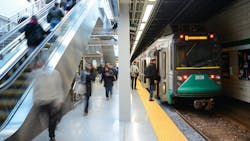MBTA forges ahead despite financial crisis due to the pandemic
The Massachusetts Bay Transportation Authority (MBTA), like many agencies across the country, is experiencing a financial crisis due to low ridership and lost fare revenues as a result from the pandemic.
In a typical fiscal year, several factors—including ridership and the general state of the economy—influence the MBTA’s budget. COVID-19 has significantly impacted many of these things, resulting in an estimated budget deficit of at least $300 million for Fiscal Year 2022.
While ridership levels are slowly increasing, MBTA says it expects external factors (like vaccine availability) will continue to cause uncertainty for its finances. As the agency plans for the next few years, it is revisiting revenue assumptions and spending plans to balance budgets and respond to the COVID-19 pandemic.
Plan to forge ahead
The MBTA received more than $800 million of the $25 billion provided to transit agencies nationwide as part of the CARES Act. MBTA says it has been able to balance this year’s budget with this one-time infusion of federal funding, a critical lifeline for it and other transit agencies. Looking ahead, the gap between revenue and expenses is expected to grow. To address that anticipated gap, MBTA is starting to make decisions about its priorities.
Forging Ahead is the plan to begin addressing next year’s budget gap. In early October, the Fiscal and Management Control Board (FMCB) endorsed a three-pronged approach of capital reallocation, service planning and cost controls:
- The capital reallocation exercise identifies capital projects to slow, stop or scale down to allow funds to be reallocated to preventative maintenance on the operating budget.
- The service planning exercise focuses on preserving essential service for high-ridership modes, routes, and lines and transit-critical populations, when making any targeted reductions.
- The cost control exercise develops proposals to tighten financial controls and reduce expenditures.
Defining essential service
Through these difficult budget conversations, MBTA aims to align service to accommodate the transit needs of people using the system today.
Essential service:
- Supports riders who continue to rely on the T for essential service, with particular attention to equity.
- Serves communities where transit is critical, including communities with residents who are low-income, people of color, seniors, people with disabilities or who live in households with few or no vehicles (high transit critical populations).
- Serves populations that have higher ridership potential, based on current and pre-COVID ridership (high transit propensity populations).
MBTA says its goal is to maintain essential service at or above “minimum” service levels outlined in the MBTA Service Delivery Policy.
Service trade offs
While MBTA works to preserve essential service, it says it cannot ignore that tradeoffs do exist: The MBTA will need to reduce service where it is unable to sustain normal service levels due to low ridership.
Some of these proposed trade-offs include situations where:
- Riders may need to switch modes or make more transfers. This may apply in places where transit serves populations where transit is less critical; and serves populations where ridership is likely to return.
- Riders may need to walk further for transit service. This may apply in places where transit serves populations where transit is critical; and serves populations where ridership is less likely to return.
- Service may be reduced or eliminated in areas with low ridership. This may apply in places where transit serves populations where transit is less critical; and serves populations where ridership is less likely to return.
Riders in these areas may experience less frequent service, cuts to service hours or service suspensions. During October, and with feedback from the public, MBTA will determine which tradeoffs to apply to specific routes, lines, stops and stations in each of the categories above.
Community liaisons
To help gather feedback directly from riders, the MBTA has established a team of community liaisons. This team will reach out to communities directly impacted by proposed service changes for input and feedback.
